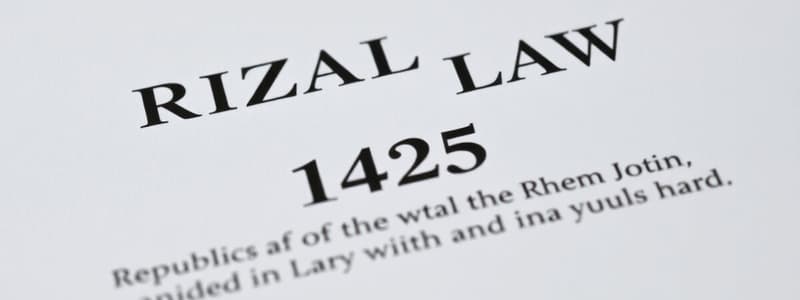Podcast
Questions and Answers
What was one of the main arguments presented by oppositors of the Rizal Law?
What was one of the main arguments presented by oppositors of the Rizal Law?
- The law would limit the publication of religious texts.
- The original texts of Rizal’s works are too long for students.
- The law requires all schools to offer religious education.
- Only a few pages in the Noli Me Tangere are nationalistic. (correct)
Which group played a significant role in opposing the Rizal Law?
Which group played a significant role in opposing the Rizal Law?
- The Board of National Education
- The Purok organizations
- The Catholic Bishops Conference of the Philippines (correct)
- Public school teachers
Which section of the Rizal Law allows for translations of Rizal's works?
Which section of the Rizal Law allows for translations of Rizal's works?
- Section 2
- Section 5
- Section 3 (correct)
- Section 1
What impact did the Rizal Law have on public school discussions?
What impact did the Rizal Law have on public school discussions?
What was the primary purpose of the amendment to the Rizal Law?
What was the primary purpose of the amendment to the Rizal Law?
How did Congress respond to the proposed Rizal Law?
How did Congress respond to the proposed Rizal Law?
What was one recommendation made by the Board of National Education regarding Rizal's works?
What was one recommendation made by the Board of National Education regarding Rizal's works?
Which of Rizal’s works was cited as having anti-Catholic passages?
Which of Rizal’s works was cited as having anti-Catholic passages?
What was a primary reason for launching the Rizal Law?
What was a primary reason for launching the Rizal Law?
Which institution was known for opposing the Rizal Bill?
Which institution was known for opposing the Rizal Bill?
Who sponsored the Rizal Bill in the Senate?
Who sponsored the Rizal Bill in the Senate?
When did the Senate begin debate sessions on the Rizal Bill?
When did the Senate begin debate sessions on the Rizal Bill?
Which of the following is NOT a reason for opposition to the Rizal Bill?
Which of the following is NOT a reason for opposition to the Rizal Bill?
What was a notable effect of the Rizal Bill on education?
What was a notable effect of the Rizal Bill on education?
Which of the following individuals is a notable opponent of the Rizal Bill?
Which of the following individuals is a notable opponent of the Rizal Bill?
What similar bill was filed in the House of Representatives?
What similar bill was filed in the House of Representatives?
Who among the following was NOT listed as a supporter of the Rizal Bill?
Who among the following was NOT listed as a supporter of the Rizal Bill?
What was a significant concern for priests opposing the Rizal Bill?
What was a significant concern for priests opposing the Rizal Bill?
What was the outcome of the Senate and House sessions regarding the Rizal Bill?
What was the outcome of the Senate and House sessions regarding the Rizal Bill?
What constitutional provision was cited as potentially violated by the Rizal Bill?
What constitutional provision was cited as potentially violated by the Rizal Bill?
Which of the following individuals expressed concern about the novels' impact on Catholic students?
Which of the following individuals expressed concern about the novels' impact on Catholic students?
What did supporters of the Rizal Bill refer to those opposing it?
What did supporters of the Rizal Bill refer to those opposing it?
How did the priests view the author of the novels, Jose Rizal?
How did the priests view the author of the novels, Jose Rizal?
What was mandated by Section 1 of the Rizal Law in schools?
What was mandated by Section 1 of the Rizal Law in schools?
Flashcards
Rizal Law
Rizal Law
Republic Act 1425 enacted in 1956 mandating study of José Rizal's works.
José Rizal
José Rizal
Philippine national hero known for his novels advocating reform.
Republic Act 1425
Republic Act 1425
Law that requires inclusion of Rizal's life and writings in education.
Claro M. Recto
Claro M. Recto
Signup and view all the flashcards
Noli Me Tangere
Noli Me Tangere
Signup and view all the flashcards
El Filibusterismo
El Filibusterismo
Signup and view all the flashcards
Catholic Church's opposition
Catholic Church's opposition
Signup and view all the flashcards
Nationalism
Nationalism
Signup and view all the flashcards
Amendments to the law
Amendments to the law
Signup and view all the flashcards
Access to Rizal's works
Access to Rizal's works
Signup and view all the flashcards
Civic engagement
Civic engagement
Signup and view all the flashcards
Archbishop Santos
Archbishop Santos
Signup and view all the flashcards
National identity
National identity
Signup and view all the flashcards
Community organizations
Community organizations
Signup and view all the flashcards
Opposition groups
Opposition groups
Signup and view all the flashcards
Emilio Cortez
Emilio Cortez
Signup and view all the flashcards
Historical remembrance
Historical remembrance
Signup and view all the flashcards
Philippine languages
Philippine languages
Signup and view all the flashcards
Rizal's legacy
Rizal's legacy
Signup and view all the flashcards
Freedom of conscience
Freedom of conscience
Signup and view all the flashcards
National pride
National pride
Signup and view all the flashcards
Illicit teachings
Illicit teachings
Signup and view all the flashcards
Historical education
Historical education
Signup and view all the flashcards
Study Notes
The Rizal Law
-
The Rizal Law (Republic Act 1425) was enacted on June 12, 1956 by Philippine President Ramon Magsaysay.
-
The law mandated courses on the life, works and writings of José Rizal, particularly his novels Noli Me Tangere and El Filibusterismo, to be included in all schools, colleges and universities, public or private.
-
Senator Claro M. Recto authored the Rizal Bill, which was supported by Jose P. Laurel Sr. and introduced to the Senate on April 17, 1956.
Support and Opposition
- The Rizal Bill was debated fiercely, with the Catholic Church actively opposing it.
- Those who supported the Rizal Law saw it as a way to re-dedicate to the ideals of freedom and nationalism that Rizal championed.
- The Catholic Church vehemently opposed the bill, arguing that it violated the freedom of conscience and religion. They believed that the novels attack Catholic teachings and could influence students against religious doctrines.
- The Catholic Church also argued that the novels were harmful to the priesthood, portraying them negatively.
Key Provisions of The Rizal Law
- The law required all schools to keep unexpurgated editions of Rizal's works in their libraries.
- The law mandated the translation of Rizal's novels into English, Tagalog and other Philippine languages.
- The law highlighted the importance of making Rizal's works accessible to the public by printing them in affordable editions and distributing them through community organizations.
- The law was amended to ensure that unexpurgated editions of the novels would not be mandatory for elementary and secondary schools.
- The law also explicitly stated that discussing religious doctrines within public schools would remain prohibited.
Notable Individuals and Organizations
- Representatives of the Catholic Action of the Philippines, The Congregation of the Mission, Knights of Columbus, and the Catholic Teachers Guild were among the organizations that opposed the Rizal Law.
- Archbishop Santos, Decoroso Rosales, Francisco “Soc” Rodrigo, and Mariano Cuenco were prominent individuals who voiced opposition to the law.
- Congressman Emilio Cortez, Congressman Mariano Bengzon, and Congressman Joaquin Roces were among the prominent individuals who supported the Rizal Law.
Reasons for Launching the Bill
- The Rizal Law was created to rediscover and re-emphasize the nationalistic values and ideals that Rizal embodied.
- It aimed to help remember and learn from the past to foster a more enlightened and patriotic Filipino identity.
- It sought to recalibrate national consciousness and promote a sense of shared history and national pride.
Significance of the Rizal Law
- The Rizal Law, although a source of debate and contention, ultimately became a cornerstone of Filipino nationalism and civic education.
- It contributed to shaping a sense of national identity and promoted civic engagement among Filipinos.
- The law established Rizal's legacy as a national hero and his works as essential readings for understanding Filipino history and culture.
Studying That Suits You
Use AI to generate personalized quizzes and flashcards to suit your learning preferences.




